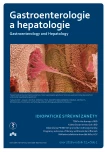Quality of life in patients with inflammatory bowel diseases in the Czech Republic – a multicentre study
Authors:
D. Ďuricová 1
; M. Pfeiferová 2; M. Bortlík 1,3,4; B. Pipek 5
; I. Mikoviny Kajzrlíková 6; K. Dušek 2; M. Lukáš 1,7*
Authors‘ workplace:
Klinické a výzkumné centrum pro střevní záněty ISCARE I. V. F. a. s., Praha
1; Pacienti IBD, z. s., Praha
2; Interní klinika 1. LF UK a ÚVN – VFN Praha
3; Farmakologický ústav, 1. LF UK a VFN v Praze
4; Centrum péče o zažívací trakt, Vítkovická nemocnice, a. s., Ostrava
5; Beskydské gastrocentrum, Interní oddělení, Nemocnice ve Frýdku-Místku, p. o.
6; Ústav lékařské biochemie a laboratorní diagnostiky, 1. LF UK a VFN v Praze
7
Published in:
Gastroent Hepatol 2018; 72(1): 11-19
Category:
IDB: Original Article
doi:
https://doi.org/10.14735/amgh201811
*Pacientská organizace Pacienti IBD
Overview
Introduction:
Assessment of quality of life and other functional results in patients with inflammatory bowel disease (IBD) has become an essential part of patient evaluation, including assessment of the efficacy of medical therapy. The aim of this study was to assess adherence to medical therapy, employment rate and ability to work, and quality of life and knowledge of IBD among IBD patients in the Czech Republic.
Methods:
Patients were alerted to the study by their attending gastroenterologist or nurse, by the organisers of the annual patients’ conference, or via the website of Patients IBD organisation. They completed a questionnaire comprising 47 questions divided into five sections. The majority of the participants completed the print version of the questionnaire, with only a small number using the online version.
Results:
In total, 1,228 IBD patients from all regions of the Czech Republic participated in this survey. Two-thirds suffered from Crohn’s disease, and the remainder were diagnosed with ulcerative colitis or IBD unclassified. At the time of the survey, most patients were in remission. One-third of patients (34.4%) reported intermittent non-adherence, which was unintended (due to forgetfulness) in most cases (76%). Adherence to medical therapy was higher in older patients and those interested in information about IBD. The ability to work and quality of life were also impaired in IBD patients.
Conclusion:
Both Crohn’s disease and ulcerative colitis have a negative impact on quality of life and the ability to work. One-third of patients were non-adherent to medical therapy.
Key words:
inflammatory bowel disease – quality of life – employment – invalidity
Submitted:
23. 1. 2018
Accepted:
30. 1. 2018
The authors declare they have no potential conflicts of interest concerning drugs, products, or services used in the study.
The Editorial Board declares that the manuscript met the ICMJE „uniform requirements“ for biomedical papers.
Sources
1. Burisch J, Jess T, Martinato M et al. The burden of inflammatory bowel disease in Europe. J Crohns Colitis 2013; 7 (4): 322–337. doi: 10.1016/j.crohns.2013.01.010.
2. Duricova D, Burisch J, Jess T et al. Age-related differences in presentation and course of inflammatory bowel disease: an update on the population-based literature. J Crohns Colitis 2014; 8 (11): 1351–1361. doi: 10.1016/j.crohns. 2014.05.006.
3. Sturm A, Maaser C, Mendall M et al. European Crohn‘s and Colitis Organisation topical review on IBD in the elderly. J Crohns Colitis 2017; 11 (3): 263–273. doi: 10.1093/ecco-jcc/jjw188.
4. Lönnfors S, Vermeire S, Greco M et al. IBD and health-related quality of life – discovering the true impact. J Crohns Colitis 2014; 8 (10): 1281–1286. doi: 10.1016/j.crohns.2014.03. 005.
5. Bernstein CN, Singh S, Graff LA et al. A prospective population-based study of triggers of symptomatic flares in IBD. Am J Gastroenterol 2010; 105 (9): 1994–2002. doi: 10.1038/ajg. 2010.140.
6. Jackson CA, Clatworthy J, Robinson A et al. Factors associated with non-adherence to oral medication for inflammatory bowel disease: a systematic review. Am J Gastroenterol 2010; 105 (3): 525–539. doi: 10.1038/ajg.2009.685.
7. Červený P, Bortlík M, Kubena A et al. Nonadherence in inflammatory bowel disease: results of factor analysis. Inflamm Bowel Dis 2007; 13 (10): 1244–1249.
8. Sewitch MJ, Abrahamowicz M, Barkun A et al. Patient nonadherence to medication in inflammatory bowel disease. Am J Gastroenterol 2003; 98 (7): 1535–1544.
9. Kalafateli M, Triantos C, Theocharis G et al. Health-related quality of life in patients with inflammatory bowel disease: a single-center experience. Ann Gastroenterol 2013; 26 (3): 243–248.
10. Gray WN, Denson LA, Baldassano RN et al. Disease activity, behavioral dysfunction, and health-related quality of life in adolescents with inflammatory bowel disease. Inflamm Bowel Dis 2011; 17 (7): 1581–1586. doi: 10.1002/ibd.21520.
11. Büsch K, da Silva SA, Holton M et al. Sick leave and disability pension in inflammatory bowel disease: a systematic review. J Crohns Colitis 2014; 8 (11): 1362–1377. doi: 10.1016/j.crohns.2014.06.006.
Labels
Paediatric gastroenterology Gastroenterology and hepatology SurgeryArticle was published in
Gastroenterology and Hepatology

2018 Issue 1
- Metamizole vs. Tramadol in Postoperative Analgesia
- The Importance of Limosilactobacillus reuteri in Administration to Diabetics with Gingivitis
- Safety and Tolerance of Metamizole in Postoperative Analgesia in Children
- Metamizole in perioperative treatment in children under 14 years – results of a questionnaire survey from practice
Most read in this issue
- VSL#3 – the first highly concentrated therapeutic probiotic with multiple bacterial strains and a proven therapeutic efficacy
- Gastroenterology and renal diseases
- The role of CT colonography in large bowel investigation
- Guidelines of the IBD working group of the Slovak Society of Gastroenterology on the management of Crohn’s disease
